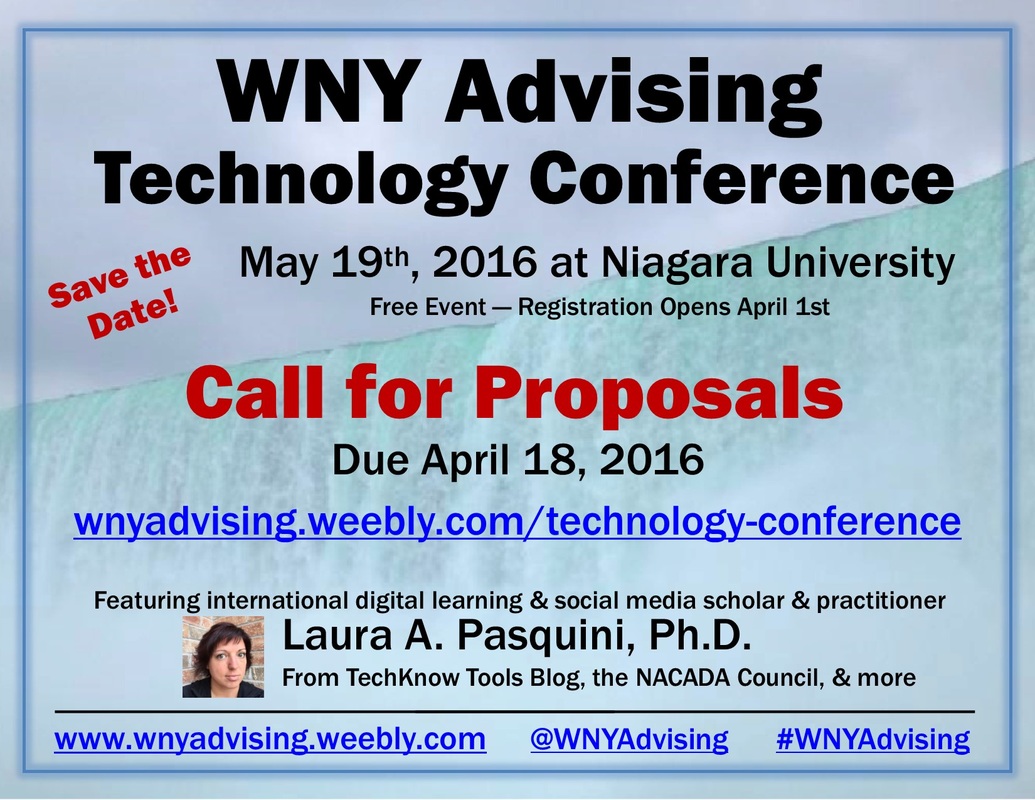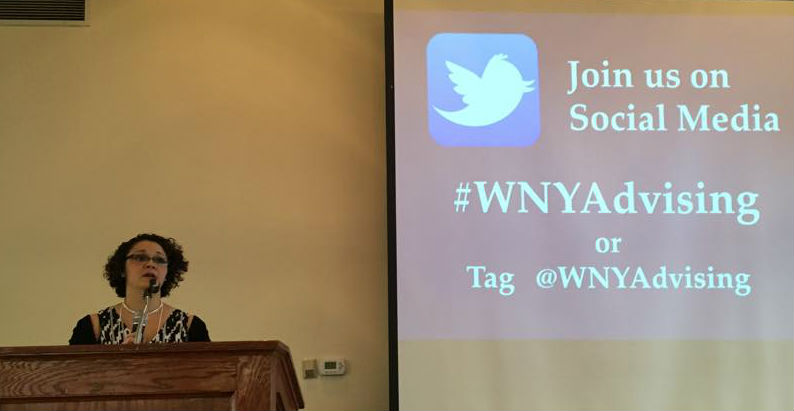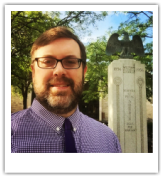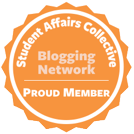|
WNY Advising Technology Conference Thursday May 19, 2016 at Niagara University wnyadvising.weebly.com/technology-conference Please share the attached PDF with anyone who you think might be interested
- John Sauter @johnpsauter Downloadable Flyer for Sharing
45 Comments
For academic advisors and higher education professionals, traveling to a regional or national conference can be invigorating. They are a great place to network, learn about trending issues, and reflect on your own practices. However, they are also expensive. New professionals no longer can take advantage of the discounted student rates. Many departmental and institutional budgets are stretched thin. The average cost of many national conferences becomes prohibitive, when you add in travel and hotels. Thankfully some conferences offer scholarships and honorariums for presenters. But the ability to go to multiple conferences or geographically distant conferences is limited. Hard choices have to be made, especially if you want to get more involved in presenting or leadership roles within the organization.
These do not need to limit your learning or networking. Conference back-channels are a way that social media savvy professionals, who know about social media back-channels, stay in touch with each other at the conferences, learning from each other's insights, networking, and trends at various conferences across the nation/world. Much of this is concentrated on Twitter, where you don't need to be at the conference or even a very active Twitter user, to benefit from the conversations. These channels may be obvious to professionals who use social media frequently, but many colleagues don't take advantage of these opportunities and they aren't always used intentionally at local or regional conferences. Back-Channels form around specific hashtags (#...) for the conference, often including the year for national ones. These, often publicized, hashtags, link conference goers and can be followed by anyone with a twitter account. However, don't forget that the official conference accounts (@....) and regional accounts (@... r1) may also be sharing details. While a conference is restricted to specific dates, back-channels are not so you can go back in time to previous conferences (#NACADA14) or even get previews of upcoming conferences (#NACADA15) and sessions. They can also form around specific presentations (#bringyoself) to link conversations within the conference to specific topics. Many presenters often post materials on their twitter accounts or blogs and some conferences such as NACADA ask presenters to post handouts (WNY Advising Conference Presentations). #ACPA15 Also #ACPA or @ACPA #NASPA15 Also #NASPA or @NASPAtweets #NACADA15 Also #NACADA or @NACADA #WNYAdvising Also @WNYAdvising #NACADAR9 #NACADAR7 Also @NACADA_regvii #NACADAR1 Also @nacada_region1 #FYConference #CSPA14 More examples and hashtags. Other hashtags for future conferences may pop up in your feeds as you expand your Twitter network and follow more #Acadv or #SAPro related accounts. Tips for following Back-Channels vary depending on what platform or app you are using. If you are using Twitter, search for the hashtag and then select all at the top of the stream to reach the full stream. I prefer Tweetdeck (A desktop version) on my Chromebook, where I can log in with Twitter, search for the hashtag and set up streams based on certain hashtags and users (i.e. "#NACADA14 OR #NACADA15 OR @NACADA OR .#acadv OR #NACADA OR #AdvTech"). On a personal note, the #NACADA14 back-channel really changed my professional practice, and changed how I network. I didn't worry as much which session I attended to get the most information, as the back-channel provided notes and slides from the other sessions, and my colleagues shared, or favorited some of the most interesting materials. Being there also allowed for at Tweetup where I got to meet many of the people I had connected with online. Not only did this improve my experience at the conference, but it also created many professional relationships which have morphed into shared resources, interactive endeavors, and conference proposals. So, the next time your budget, responsibilities, or geographic location prevents you from attending a conference, don't fret, just look for the back-channel. Also, if you are involved in planning a regional or national conference, make sure to be intentional in creating a hashtag back-channel to enhance the conference experience and expand its influence to other professionals across the nation or world. John Sauter Jr., Ph.D. Assistant Dean for Academic Affairs, Niagara University Coordinator of WNY Advising [email protected] @JohnPSauter The following cross-posted blog developed from a question I asked Laura A. Pasquini, Ph.D. regarding an upcoming social media unit in my sociology of higher education class. Laura is a Niagara University alumna with whom I connected through WNY Advising and NACADA. If you are interested in #edtech, #edsocmedia, or #socmedia, I highly recommend following Laura on her blog, Techknow Tools, or on social media. --- John P. Sauter Jr., Ph.D.  Reprinted w. permission from Techknow Tools Laura A. Pasquini, Ph.D. Link to the Original Blog Post (2/22/15) I recently curated a reading list of literature/research on social media and technology use, specifically outside the higher ed “classroom” for a colleague at Niagara University,Dr. John Sauter. For his Sociology of Higher Education course, John wanted to share readings that demonstrate how social media and technology are being utilized outside formalized learning, and provide more information beyond the Social Media Resources [from the WNY Advising group] the practical guides/strategies. A recent prompt from my #edusocmedia friend Ove, made me think that this short list should be shared and hopefully expanded upon – enter this blog post. In searching online, you will find that there are no shortage of “how to” and “social media strategy” publications – which often bridge the marketing, communications, education, business, and student affair disciplines. A growing number of bloggers also share suggestions for social media use, community development, and campus engagement; however my focus was to find recent RESEARCH in post-secondary education that examined how social media and emerging technologies are impacting student life, support, and success outside the “classroom” (face-to-face, online & blended learning) environments. To consider social media perceptions and use outside of formal learning environments, it is important to gain insight from recent studies around learning in higher education with technologies, including: Junco, R., Heiberger, G., & Loken, E. (2011). The effect of Twitter on college student engagement and grades. Journal of computer assisted learning, 27(2), 119-132. Junco, R. (2012). Too much face and not enough books: The relationship between multiple indices of Facebook use and academic performance.Computers in Human Behavior, 28(1), 187-198. Junco, R., Elavsky, C. M., & Heiberger, G. (2013). PuttingTwitter to the test: Assessing outcomes for student collaboration, engagement and success. British Journal of Educational Technology, 44(2), 273-287. Junco, R. (2015). Student class standing, Facebook use, and academic performance. Journal of Applied Developmental Psychology, 36, 18-29. Muñoz, C. L., & Towner, T. (2011). Back to the “wall”: How to use Facebook in the college classroom. First Monday, 16(12). Roblyer, M. D., McDaniel, M., Webb, M., Herman, J., & Witty, J. V. (2010). Findings on Facebook in higher education: A comparison of college faculty and student uses and perceptions of social networking sites. Internet and Higher Education, 13(3), 134-140. Rodriguez, J. E. (2011). Social media use in higher education: Key areas to consider for educators. MERLOT Journal of Online Learning and Teaching, 7(4). Silius, K., Kailanto, M., & Tervakari, A-M. (2011). Evaluating the quality of social media in an educational context. International Journal of Emerging Technologies in Learning, 6(3), 21-27. Wakefield, J. S., Warren, S. J., Alsobrook, M., & Knight, K. A. (2013). What do they really think? Higher education students’ perceptions of using Facebook and Twitter in formal higher education learning. International Journal of Social Media and Interactive Learning Environments, 1(4), 330-354. **Shout out to Josie Ahlquist for also sharing a wealth of resources on her Reference List page related to this topic as well and more related to student development theory and youth culture in media!** My focus for this class reading list, was to find recent (2011 forward) peer-reviewed publications that share implications and findings from research on how social media impacts support/success in higher ed beyond the instructional context. Yes. Student affairs, academic advisors, and the like, in student support areas of higher ed, ARE educators – however social media/technology use for learning without the weight of the grade “carrot” does impact and influence adoption/use. In looking around, I found a number of recent literature reviews and compilations that look at social media in higher education – here are a select few I thought I would share: Davis III, C. H., Deil-Amen, R., Rios-Aguilar, C., & Gonzalez Canche, M. S. (2012). Social Media in Higher Education: A literature review and research directions. Hew, K. F., & Cheung, W. S. (2013). Use of Web 2.0 technologies in K-12 and higher education: The search for evidence-based practice. Educational Research Review, 9, 47-64. Lewis, B., & Rush, D. (2013). Experience of developing Twitter-based communities of practice in higher education. Research in Learning Technology, 21. Rios-Aguilar, C., Canché, G., Sacramento, M., Deil-Amen, R., & Davis III, C. H. (2012). The role of social media in community colleges. Tarantino, K., McDonough, J., & Hua, M. (2013). Effects of student engagement with social media on student learning: A review of literature. The Journal of Technology in Student Affairs. Tess, P. A. (2013). The role of social media in higher education classes (real and virtual)–A literature review. Computers in Human Behavior, 29(5), A60-A68. For my own interest, I decided to conduct a preliminary literature search to determine “How is social media being researched to support student development/success in higher education beyond the “classroom”? This is NOT a comprehensive list, but more of a primer to initiate a more comprehensive search for recent (2011 forward) scholarly publications involving research on this topic: Al-Harrasi, A. S., & Al-Badi, A. H. (2014). The Impact Of Social Networking: A Study Of The Influence Of Smartphones On College Students. Contemporary Issues in Education Research (CIER), 7(2), 129-136. Birnbaum, M. G. (2013). The fronts students use: Facebook and the standardization of self-presentations. Journal of College Student Development, 54(2), 155-171. Chen, B., & Bryer, T. (2012). Investigating instructional strategies for using social media in formal and informal learning. The International Review of Research in Open and Distributed Learning, 13(1), 87-104. Cheung, C. M., Chiu, P. Y., & Lee, M. K. (2011). Online social networks: Why do students use Facebook? Computers in Human Behavior, 27(4), 1337-1343. DeAndrea, D. C., Ellison, N. B., LaRose, R., Steinfield, C., & Fiore, A. (2011). Serious social media: On the use of social media for improving students’ adjustment. Internet and Higher Education, 15, 15-23. Fuller, M., & Pittarese, T. (2012, June). Effectively communicating with university students using social media: a study of social media usage patterns. In 45th Annual Conference June 10-14, 2012 (p. 46). Graham, M. (2014). Social Media as a tool for increased student participation and engagement outside the classroom in higher education. Journal of Perspectives in Applied Academic Practice, 2(3). Jacobsen, W. C., & Forste, R. (2011). The wired generation: Academic and social outcomes of electronic media use among university students. Cyberpsychology, Behavior, and Social Networking, 14(5), 275-280. Lin, M. F. G., Hoffman, E. S., & Borengasser, C. (2013). Is social media too social for class? A case study of Twitter use. TechTrends, 57(2), 39-45. Lou, L. L., Yan, Z., Nickerson, A., & McMorris, R. (2012). An examination of the reciprocal relationship of loneliness and Facebook use among first-year college students. Journal of Educational Computing Research, 46(1), 105-117. Joosten, T., Pasquini, L. A., & Harness, L. (2013). Guiding social media in our institutions.Planning for Higher Education – Society for College and University Planners. 41(2), 1-11. Mastrodicasa, J., & Metellus, P. (2013). The impact of social media on college students.Journal of College & Character, 14(1), 21-29. O’Brien, O., & Glowatz, M. (2013). Utilising a social networking site as an academic tool in an academic environment: student development from information-sharing to collaboration and innovation (ICI). AISHE-J: The All Ireland Journal of Teaching and Learning in Higher Education, 5(3). Pettijohn, T. F., LaPiene, K. E., & Horting, A. L. (2012). Relationships between Facebook intensity, friendship contingent self-esteem, and personality in US college students.Cyberpsychology, 6(1), 1-7. Ternes, J. A. (2013). Using social media to engage students in campus life. (Doctoral dissertation, Kansas State University). Sponcil, M., & Gitimu, P. (2013). Use of social media by college students: relationship to communication and self-concept. Journal of Technology Research, 4, 1-13. Wang, Z., Tcherneve, J. M., & Solloway, T. (2012). A dynamic longitudinal examination of social media use, needs, and gratifications among college students. Computers in Human Beheavior, 28(5), 1829-1839. If you have published any articles and/or have contributions for research in this area – please add to the list! Post any publication references in the comments or reach out to me to discuss further. I suspect this quest will continue, and it will also need a few collaborators to be successful. Are you interested in digging into the research to learn more about HOW we are SUPPORTING students in higher education using social media beyond formalized learning structures? Let’s talk – so we can move forward in understanding the research lay of the land. Click Here for the Original Blog Post, which includes comments & responses, including a link to additional citations from Paul Gordon Brown
There are many social networks out there. Each has strengths and weaknesses when it comes to student use, professional use, or professional development. Even if you can't make it to the national conference, social media offers a way to experience the conference back-channels, where professionals are connecting with one another, and discussing new ideas (#wnyadvising, #ACPA14, #NASPA14). Similarly social media offers a way to engage nationally or internationally on topics with other professionals through scheduled ongoing discussions (#AcAdv, #SAchat). Want to know where to start looking for professional development resources in higher education? Check out our social media page for some places to start. We are in the process of noting tips on using social media sites and indexing resources available on those sites relevant to academic advising and higher education. So far we have cataloged a number of resources associated with the following social media sites:
If you are interested in learning more about social media, be sure to check out this session at the annual Uniting Across Campuses Conference on Wednesday.
by Dr. John Sauter, Jr.
Assistant Dean for Academic Affairs, Niagara University Chair of the 2014 Uniting Across Campuses Conference by Dalene Aylward
Sr. Academic Advisor/Prehealth, University At Buffalo Technology and its usage is growing at an exponential rate. As individual advisors and as an advising community, we need to be aware of the latest technological tools and resources available to us so that we may advise our students in a way that is not only relevant to their attention, but efficient for us in our day to day endeavors. If we can utilize new technology to reach our students in a manner that they will enjoy while simultaneously providing them with important information, guidance, and sound advice, then we excel in resourcefulness. Jon Bonebrake, UB Sr. Academic Advisor/Pre-Law, has spent a good amount of time using YouTube to learn the ins and outs of recording screencasts and is using his newly acquired skills to create videos students can view online. Our office, Student Advising Services at the University at Buffalo, is embedding the videos on our websites, linking to them on our Facebook and Twitter pages, sending out to student and staff listservs, and adding buttons to our email signatures to promote these informative videos. Since prehealth & pre-law students can choose any major to complete their degree, and because students transfer between our institutions, we want to share these screencasts with all of you in the WNY Advising community. Most recently, Jon has done a fantastic job of editing & animating our prehealth committee series of screencasts I recorded. They range from about 2.5 -7.5 minutes each. If you meet with any prehealth students, feel free to share these with them, & perhaps even forward on to your student listserv if you are inclined. The first link below in particular is a series about the UB Prehealth Committee process of application & attaining letters of recommendation. We have recorded other prehealth screencasts as well that will be published at a later time. In addition, we are writing scripts for more general academic topics that will be of use to all students, so stay tuned! You can subscribe to our UB Academic Advising YouTube channel on the second link below. Technological developments and learning how to properly utilize them is a facet of professional development that isn’t always explored, but can become a worthy use of our time. I encourage you to use the annual UAC Conference on February 26, 2014 and other opportunities for professional development to fully explore the technological resources available to you and your students. Enjoy! by Dr. John Sauter, Jr.
Assistant Dean for Academic Affairs, Niagara University This week Apple's Free App of the Week for iphone/ipad is Scanner Pro. It can scan single or multiple page files to PDFs which can be added to or edited. This can be particularly useful for advisors or professionals who need to send documents to students quickly, are out of the office, or don't have a copier handy when doing research. The interface takes a bit getting used too, but once you have figured it out (and the editing feature is helpful here) it can be quite helpful. |
WNY Advising
|
||||||||||||||







 RSS Feed
RSS Feed